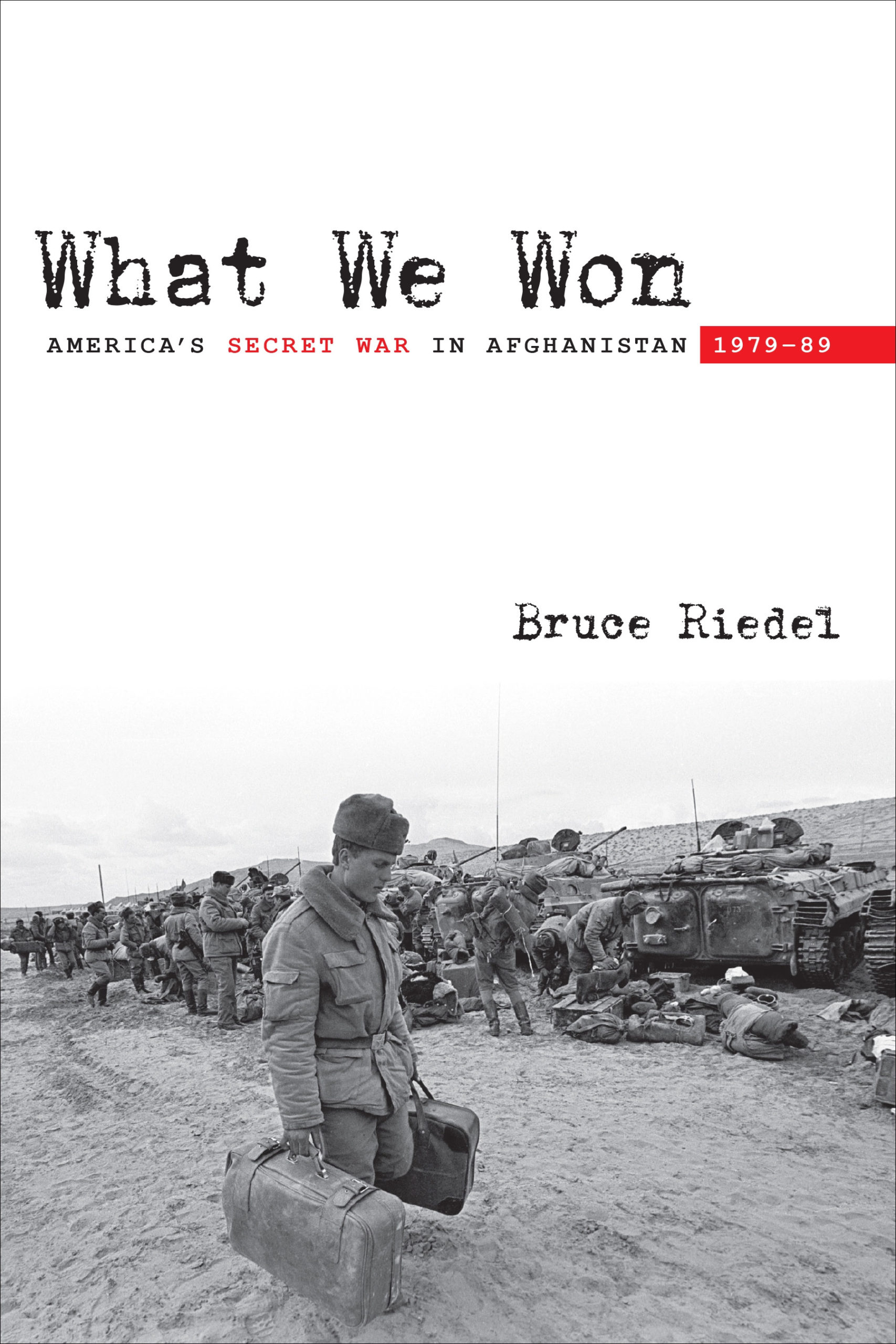The contemporary history of world politics is undeniably rooted in the intense US–USSR confrontation under the prolonged conflict of the Cold War. The global competition to dominate the international system by acquiring the status of global hegemon between capitalist and communist forces of Washington and Moscow shook the foundations of international global affairs. The period of proxy wars between the United States and Soviet Union started after WWII and ended in last decade of the twentieth century. The rivalry between both superpowers has added a new chapter in the unending books of world politics in which the opposing values and contrasting standards of intellectual community reflect interesting concepts and arguments. In this way, the intellectual communities from different regions try to summarize the history of the Cold War by contesting arguments.
Bruce Riedel, director of the Brooking Intelligence Project, part of the Brookings Center for 21st Century Security and Intelligence retired after serving thirty years in CIA in 2006. He decided to provide his fascinating examination of the four decades long Cold War by providing insight of US covert operations in Afghanistan to neutralize the Soviet threat. As a senior advisor of last four American presidents on South Asian and Middle Eastern political affairs, Riedel served as a senior member of National Security Council at the White House. The Obama administration granted him the prestigious status of chairman of a strategic review of American policy on Afghanistan and Pakistan. As one of the leading security and strategic specialists, he has authored several books and intellectually contributed in various international magazines and journals on different topics. Presently, Riedel is a senior fellow on foreign policy in Saban Center for Middle East Policy at the Brooking Institution. The inside story of the Cold War’s end which considerably was a turning point in Russian history is the central theme of What We Won: American’s Secret War in Afghanistan 1979–89.
The two parts of the book consist of nine chapters discussing the triangle alliance between Washington, Islamabad and Riyadh. The first part of the book The Players starts debate from the role of Afghan communist and ends at role of Saudis in providing financial assistance for the promotion of anti–Soviet jihad culture. The second part of Bruce Riedel’s study The U.S. War continues the story of Afghans by opening debate from the role of Jimmy Carter’s administration and ends the book by providing some lessons and concluding remarks. The five chapters in the first part and four chapters of the second part cover different perspectives of American covert operation against Soviet 40th Red Army. The final battle of cold war to end the intense hostility which lasted from 1945 to 1990 was an American attempt to teach a lesson to Soviet Union. Initially, it was an American attempt to create Afghanistan as a Vietnam for Soviet Union, but it ended the Cold War by preventing communist rule from Kabul. In this way, the CIA–ISI alliance proved to be the last episode of Moscow–Washington protracted conflict.

The dream of creating a Russian Vietnam in Afghanistan by involving Pakistan and Saudi Arabia was a secret mission of Washington. President Regan’s administration showed the intention of defeating the Soviet Union coupled with taking revenge for Vietnam (p.63). The cooperation of CIA and ISI effectively countered the strategic partnership between KGB and its Afghan counterpart, KHAD. While conversing about Islamabad’s nuclear ambition, Riedel believes that Pakistan carried a cold test of its bomb which was a nuclear test without fissionable material, but such act proved that Pakistan had all components essential to explode a bomb (p.70). The central theme of the book offers an interesting story of intelligence community based on politics of secret missions and covert operations. The Soviets extended secret services to Afghanistan which forced US to go beyond Pakistan and involve Saudi intelligence agency, the General Intelligence Directorate (GID). The author further traces the Saudi connections in Pakistan for the advancement of jihad culture and highlights the role of the Islamabad based Islamic University during Zia era (p.84). The involvement of volunteers of different nationalities in Pakistan’s anti – Soviet and American sponsored campaign inaugurated a phase of global jihad.
Bruce Riedel points out secret documents of intelligence community and also emphasises on the code names of diverse secret operations of aforementioned intelligence agencies. American leading geo-strategists, like Brzezinski, heavily believe that the communist invasion in Afghanistan, if not countered appropriately, would reach the Indian Ocean. Therefore, the involvement of Islamabad and Riyadh in Washington’s decisive plan of CIA’s covert activities preferred to be an apposite strategy which would turn Afghanistan into Soviet Union’s Vietnam ultimately (p.120). The last chapter of the book summarizes the whole discussion by offering five lessons for Washington by overhauling the planning, strategies and their execution at the end of Cold War. The conclusion in the last chapter examines the American planning to eliminate the Soviet sponsored communist conquest of Kabul. Riedel’s research reveals empirically the confusion, misunderstanding and overestimation of their political capabilities which resulted in unintended results for America. The unplanned post – war situation caused unforeseen and un-estimated outcome in the form of 9/11. The poorly – structured CIA’s covert operation against Soviet forces and Washington’s un-calculated threats in post war scenario created the global anti – Moscow jihad a Frankenstein monster for the US. The abstruse strategies of CIA produced contradictory standards of Washington by launching war on terror against the Afghan mujahideen who were financially supported and strategically empowered by US at the end of Cold War to defeat the communist threat.
The book revolves around CIA’s war against the Soviet Union by strategically activating its allies without computing the consequences of American unwise and reckless policies of carrying hasty moves. The writer emphasizes the nature of war by saying it Zia’s war, not Charlie Wilson’s, who was one of the prominent architectures of the last and conclusively fight of the Cold War, because Islamabad, unlike US, created anti–Moscow operation, promoted jihadi culture, and used American supplied weaponry support to bend Moscow. The academic survey of Bruce Riedel or academic inquiries of a CIA and National Security Council veteran presents curious answers of the question about American victory over Soviet by fabricating a network of intelligence agencies.
The author selects the title of his book from a CIA’s cable from Islamabad station chief who communicated to headquarter in 1989 “We Won” which was the coded phrase that referred to the victory of Afghan war and defeat of Soviet 40th Red Army. From Pearl Harbour to the tragic incident of 9/11, several writers attempted to deliver their academic exploration in their volumes, but the study of Bruce Riedel portrays academically a different and intellectually non–traditional picture of American secret missions which ominously retains both political weaknesses and strategic mistakes. Moreover, the author introduces numerous secret documents and several influential personalities who make his observation about the future of Kabul. In short, the book outlines the role of different participants in CIA’s clandestine operation against Afghanistan’s Soviet controlled government.
The informatively analytical style of Riedel presents thought-provoking awareness of cold war to the reader. His empirical knowledge combined with unexplored primary sources offer an account of the secret planning that the US started prior to waging the war in Kabul. The book is an accurate account of the complex incidents which ended communist expansionism. It is an excellent volume which gives an unbalanced inspection of Cold War’s final chapter. It is an exceptional account of varying interesting arguments on Afghan communists and Soviet expansionists, Afghan mujahideen and Pakistani jihadi, American strategic and Saudi economic supplies.





